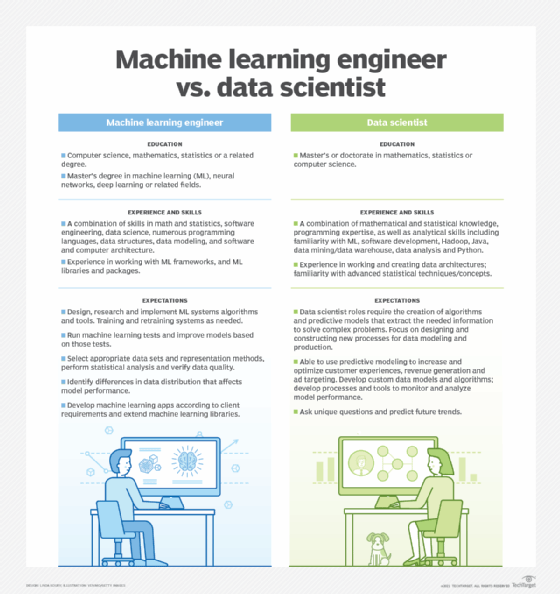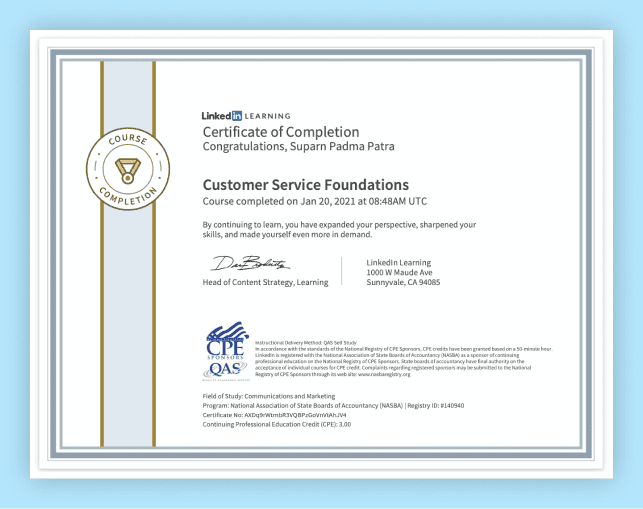All Categories
Featured
Table of Contents
- – Machine Learning Engineer Course Things To Kno...
- – Some Known Facts About Machine Learning Crash ...
- – Getting My How To Become A Machine Learning E...
- – Not known Facts About Software Developer (Ai/...
- – How Embarking On A Self-taught Machine Learn...
- – About What Do I Need To Learn About Ai And M...
- – How To Become A Machine Learning Engineer Wi...
Some people think that that's dishonesty. Well, that's my whole career. If somebody else did it, I'm mosting likely to utilize what that individual did. The lesson is putting that aside. I'm requiring myself to analyze the feasible options. It's even more regarding eating the content and trying to apply those ideas and much less about locating a library that does the job or finding someone else that coded it.
Dig a little deeper in the mathematics at the beginning, so I can build that foundation. Santiago: Ultimately, lesson number seven. This is a quote. It says "You need to comprehend every detail of a formula if you wish to utilize it." And after that I claim, "I believe this is bullshit guidance." I do not think that you have to recognize the nuts and bolts of every algorithm before you use it.
I would have to go and inspect back to actually obtain a better instinct. That does not indicate that I can not resolve points making use of neural networks? It goes back to our arranging instance I think that's just bullshit guidance.
As an engineer, I've functioned on lots of, numerous systems and I've made use of numerous, lots of points that I do not recognize the nuts and bolts of how it functions, despite the fact that I understand the effect that they have. That's the final lesson on that particular thread. Alexey: The funny thing is when I believe about all these libraries like Scikit-Learn the algorithms they utilize inside to execute, for instance, logistic regression or something else, are not the very same as the formulas we research in machine discovering courses.
Machine Learning Engineer Course Things To Know Before You Get This
Also if we tried to learn to obtain all these fundamentals of equipment knowing, at the end, the formulas that these collections utilize are various. Right? (30:22) Santiago: Yeah, definitely. I believe we need a great deal extra pragmatism in the sector. Make a great deal even more of an influence. Or focusing on supplying worth and a little bit much less of purism.
Incidentally, there are two different courses. I usually talk to those that desire to operate in the industry that wish to have their effect there. There is a path for researchers which is totally various. I do not dare to mention that since I don't recognize.
Right there outside, in the market, pragmatism goes a lengthy method for sure. Santiago: There you go, yeah. Alexey: It is a good motivational speech.
Some Known Facts About Machine Learning Crash Course For Beginners.
One of the important things I intended to ask you. I am taking a note to discuss progressing at coding. Initially, let's cover a pair of things. (32:50) Alexey: Allow's start with core tools and structures that you need to learn to actually shift. Let's claim I am a software engineer.
I recognize Java. I recognize how to utilize Git. Possibly I recognize Docker.
Santiago: Yeah, absolutely. I think, number one, you must start learning a little bit of Python. Since you currently know Java, I do not believe it's going to be a substantial change for you.
Not because Python is the exact same as Java, but in a week, you're gon na obtain a lot of the distinctions there. Santiago: After that you get particular core devices that are going to be used throughout your entire occupation.
Getting My How To Become A Machine Learning Engineer - Exponent To Work
You obtain SciKit Learn for the collection of equipment discovering algorithms. Those are devices that you're going to have to be utilizing. I do not suggest simply going and discovering regarding them out of the blue.
We can discuss specific courses later. Take one of those courses that are mosting likely to start introducing you to some problems and to some core concepts of artificial intelligence. Santiago: There is a course in Kaggle which is an intro. I don't bear in mind the name, yet if you go to Kaggle, they have tutorials there free of charge.
What's great concerning it is that the only requirement for you is to recognize Python. They're mosting likely to offer a trouble and tell you how to utilize choice trees to address that details trouble. I think that process is extremely powerful, because you go from no equipment learning history, to comprehending what the issue is and why you can not resolve it with what you know right currently, which is straight software engineering techniques.
Not known Facts About Software Developer (Ai/ml) Courses - Career Path
On the other hand, ML designers specialize in building and releasing artificial intelligence versions. They concentrate on training designs with data to make forecasts or automate tasks. While there is overlap, AI designers take care of even more diverse AI applications, while ML designers have a narrower concentrate on artificial intelligence algorithms and their sensible application.

Device learning designers concentrate on creating and releasing machine knowing models into manufacturing systems. They service design, ensuring models are scalable, efficient, and incorporated into applications. On the various other hand, data scientists have a more comprehensive role that consists of data collection, cleaning, expedition, and building versions. They are typically accountable for drawing out understandings and making data-driven choices.
As companies significantly embrace AI and equipment learning technologies, the need for proficient specialists grows. Machine knowing designers work on sophisticated jobs, add to technology, and have competitive incomes.
ML is fundamentally various from typical software application advancement as it concentrates on mentor computer systems to find out from data, as opposed to programs specific policies that are implemented systematically. Unpredictability of results: You are probably utilized to creating code with foreseeable results, whether your function runs once or a thousand times. In ML, nevertheless, the end results are much less particular.

Pre-training and fine-tuning: Exactly how these versions are trained on huge datasets and afterwards fine-tuned for details tasks. Applications of LLMs: Such as text generation, view evaluation and info search and retrieval. Papers like "Attention is All You Required" by Vaswani et al., which presented transformers. On-line tutorials and programs focusing on NLP and transformers, such as the Hugging Face course on transformers.
How Embarking On A Self-taught Machine Learning Journey can Save You Time, Stress, and Money.
The capacity to manage codebases, combine modifications, and resolve problems is just as essential in ML advancement as it is in conventional software application projects. The abilities created in debugging and screening software application applications are very transferable. While the context may transform from debugging application logic to recognizing issues in data handling or design training the underlying principles of systematic investigation, hypothesis testing, and iterative refinement coincide.
Device learning, at its core, is heavily dependent on stats and probability theory. These are critical for understanding exactly how algorithms find out from information, make forecasts, and examine their efficiency.
For those interested in LLMs, a comprehensive understanding of deep discovering styles is valuable. This includes not only the technicians of semantic networks however also the architecture of particular models for various usage cases, like CNNs (Convolutional Neural Networks) for picture handling and RNNs (Persistent Neural Networks) and transformers for sequential data and all-natural language processing.
You ought to understand these concerns and find out techniques for determining, alleviating, and communicating about prejudice in ML versions. This includes the prospective impact of automated decisions and the ethical ramifications. Numerous designs, especially LLMs, require significant computational sources that are frequently provided by cloud systems like AWS, Google Cloud, and Azure.
Building these skills will not only assist in a successful transition into ML but also make certain that designers can add effectively and sensibly to the innovation of this vibrant area. Theory is essential, yet nothing defeats hands-on experience. Start working on jobs that permit you to apply what you've discovered in a practical context.
Get involved in competitions: Join systems like Kaggle to take part in NLP competitions. Build your tasks: Start with straightforward applications, such as a chatbot or a text summarization tool, and slowly boost intricacy. The area of ML and LLMs is rapidly advancing, with brand-new breakthroughs and technologies emerging routinely. Remaining upgraded with the most recent research and patterns is essential.
About What Do I Need To Learn About Ai And Machine Learning As ...
Join communities and online forums, such as Reddit's r/MachineLearning or area Slack networks, to review ideas and get suggestions. Go to workshops, meetups, and seminars to get in touch with various other professionals in the area. Add to open-source tasks or create blog site posts regarding your discovering journey and jobs. As you obtain experience, begin looking for chances to incorporate ML and LLMs right into your job, or seek brand-new duties concentrated on these technologies.

Potential usage cases in interactive software, such as referral systems and automated decision-making. Recognizing uncertainty, standard analytical measures, and probability circulations. Vectors, matrices, and their role in ML algorithms. Mistake minimization methods and gradient descent clarified merely. Terms like model, dataset, functions, tags, training, inference, and validation. Data collection, preprocessing strategies, version training, examination procedures, and implementation considerations.
Choice Trees and Random Forests: User-friendly and interpretable versions. Support Vector Machines: Optimum margin classification. Matching issue kinds with proper designs. Balancing efficiency and complexity. Standard structure of neural networks: neurons, layers, activation features. Layered computation and ahead proliferation. Feedforward Networks, Convolutional Neural Networks (CNNs), Recurring Neural Networks (RNNs). Photo acknowledgment, sequence forecast, and time-series analysis.
Data flow, transformation, and attribute engineering strategies. Scalability principles and efficiency optimization. API-driven techniques and microservices integration. Latency monitoring, scalability, and variation control. Continual Integration/Continuous Release (CI/CD) for ML process. Version monitoring, versioning, and efficiency tracking. Identifying and attending to adjustments in version efficiency over time. Dealing with efficiency bottlenecks and resource monitoring.
How To Become A Machine Learning Engineer Without ... - The Facts

Program OverviewMachine discovering is the future for the following generation of software program specialists. This program acts as a guide to maker knowing for software application engineers. You'll be presented to three of the most appropriate components of the AI/ML discipline; overseen learning, semantic networks, and deep understanding. You'll grasp the differences between typical programming and device discovering by hands-on advancement in monitored understanding before building out complex dispersed applications with neural networks.
This training course works as an overview to maker lear ... Program Much more.
Table of Contents
- – Machine Learning Engineer Course Things To Kno...
- – Some Known Facts About Machine Learning Crash ...
- – Getting My How To Become A Machine Learning E...
- – Not known Facts About Software Developer (Ai/...
- – How Embarking On A Self-taught Machine Learn...
- – About What Do I Need To Learn About Ai And M...
- – How To Become A Machine Learning Engineer Wi...
Latest Posts
He Ultimate Guide To Coding Interview Preparation In 2025
The Best Courses For Machine Learning Interview Preparation
How To Answer Algorithm Questions In Software Engineering Interviews
More
Latest Posts
He Ultimate Guide To Coding Interview Preparation In 2025
The Best Courses For Machine Learning Interview Preparation
How To Answer Algorithm Questions In Software Engineering Interviews